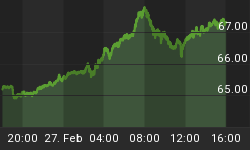To quell investor concerns during the inflating dotcom bubble, Wall Street offered soothing commentaries from analysts such as Henry Blodget, Jack Grubman, and Mary Meeker, that explained why the "old economy" rules no longer applied. The latest twist on this "black is white" spin was offered by Bear Stearn's chief economist David Malpass, who in a recent editorial in The Wall Street Journal outlined why in the new global economy borrowing and spending, rather than savings and production, are the true engines of economic strength. Just as Blodget and the gang tried to justify ridiculous valuations for profitless internet stocks, Malpass uses similar logic to justify why America's enormous trade and current account imbalances are good for our economy.
Back in the 1990's, corporate losses were touted as evidence of a bright future. We were told it was a cyber "land-grab" where eyeballs and page views replaced sales and earnings. The calculations were necessary to keep the IPO spigots open and Wall Street profits flowing. Just as red ink was supposedly a sign of strength in the dotcom era, Malpass now tells us that America's gargantuan trade deficits and its lack of domestic savings and real goods production are actually signs of its growing economic might. Investors who buy into this nonsense will suffer the fate of those who bought shares of pets.com.
To rationalize why trade deficits can be a good thing, Wall Street is pointing to the seemingly positive benefits of the "capital account surplus" that mirrors the deficit. On the surface this seems to make some sense, as most people have positive associations with "surpluses." The thinking goes that our trade "deficit" is O.K. because it is balanced by a "surplus" somewhere else. However, having a surplus of bad things, such as poverty, hunger, crime, etc, is not a good thing. A capital account surplus is really a surplus of liabilities. This is not a good thing.
When a nation enjoys a trade surplus it accumulates foreign currency that it uses to purchase foreign assets, such as real estate, stocks, and bonds. These assets represent future sources of income in the form of rents, dividends, and interest. These foreign investments constitute a capital account deficit, which balance their current account surplus. However, the capital account deficits are actually the positive result of the current account surpluses. Alternatively, when the U.S. runs current account deficits, it is forced to accumulate capital account surpluses. These surpluses reflect the sale of American assets, such as real estate, stocks and bonds, to foreigners, that intern represent future obligations in the form of rents, dividends, and interest. In other words, the "surplus" refers to the accumulation of foreign liabilities.
If our capital account surplus is good then by extension Japan's capital account deficit must be bad. The difference between creditor and debtor nations is that debtor nations derive their status by running capital account surpluses while creditor nations achieved theirs by running capital account deficits. Does Wall Street really expect us to believe that a nation is better off being a debtor than a creditor?
The largest part of our current account deficit is the trade deficit. Because Americans cannot afford to pay for all their imports with exports, they in effect buy them on credit. The resulting accumulation of liabilities is recorded as a capital account surplus. However, such surpluses are nothing to brag about. They merely constitute the debts we incur in order to finance our current account deficits.
The situation is analogous to a consumer justifying his purchase of a big screen TV on credit because it is offset by his rising debit balance. The bill the consumer eventually gets is in effect a statement of his capital account surplus. By running a trade deficit with the electronics store, the consumer simultaneously runs a capital account surplus with the retailer as well. He gets their big screen without paying for it (his trade deficit) and the retailer gets his IOU in exchange (his offsetting capital account surplus.)
A corollary to this argument is that America's capital account surplus exists because returns on American assets are superior to those available elsewhere. This difference supposedly induces foreigners to sell us their products so they can earn the money necessary to invest in our assets. This ignores the fact that for the past seven years U.S. markets have underperformed just about every other market in the world. Also the vast majority of the capital account surplus consists of bonds, the majority of which are being purchased by foreign central banks precisely because private investors do not want the lousy returns they offer.
The dangers of America's trade deficit have been a common refrain in my past commentaries. Rather than repeating myself here I refer to my commentary from March of 2005 entitled "Even Stephen Roach has it Wrong," which contains my favorite analogy on the subject (six Asians and one American stranded on an island) http://www.europac.net/archives.asp?year=2005&qtr=1. In addition, I completely debunk the myth of global dependence on American consumption in my forthcoming book entitled "Crash-Proof" which can now be ordered (pre-publication) at http://www.europac.net/books.asp.
Also as you ring in 2007 why not resolve to protect your wealth and preserve your purchasing power before it's too late. Discover the best way to buy gold at www.goldyoucanfold.com, download my free research report on the powerful case for investing in foreign equities available at www.researchreportone.com, and subscribe to my free, on-line investment newsletter at http://www.europac.net/newsletter/newsletter.asp.















